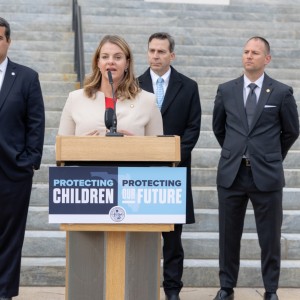From Robin Williams to Sarasota's Streets: Exploring Mental Health Policy
Todays News
SRQ DAILY FRESHLY SQUEEZED CONTENT EVERY MORNING
WEDNESDAY AUG 20, 2014 |
BY JACOB OGLES
Whether studying the underlying cause of why transients continue living on the streets in downtown Sarasota or unlocking how the funniest man alive could become so depressed he would commit suicide, the subject of mental health has increasingly made headlines here and nationwide. A town hall held at New College of Florida with two Congressmen sought out support for a new approach to treating mental disorders in America and explored the impact such policy might have on Southwest Florida.
U.S. Rep. Vern Buchanan, R-Sarasota, hosted the town hall event with guest U.S. Rep. Tim Murphy, R-Pennsylvania. Murphy was tasked by House leadership in early 2013, after the Sandy Hook Elementary School shooting in Connecticut when Adam Lanza killed 20 children and six faculty members, with investigating shortcomings in mental health services within the United States. In December, Murphy introduced the Mental Health Crisis Act to address such issues and is now rallying support for the legislation. Both Congressmen sat down with SRQ to discuss the issue in-depth.
"We have seen in the last 20 years more serious problems with the lack of treatment for the mentally ill," said Murphy, a psychiatrist by trade. He notes that 70 years ago, the country had nearly 600,000 inpatient psychiatric beds for a population of roughly 150 million people. Today, the nation's population has grown beyond 316 million but the number of inpatient psychiatric beds has dropped to fewer than 40,000.
While both Congressmen at the Tuesday town hall were Republicans, the effort has been approached in a bipartisan fashion. Buchanan this year co-chairs the Florida Congressional Delegation along with with U.S. Rep. Alcee Hastings, D-Fort Lauderdale, and both Hastings and Buchanan have co-sponsored the legislation. The bill as of Tuesday had 96 co-sponsors, including six Florida Congressmen. Buchanan said he would like the entire Florida delegation to support the bill.
"We have issues in our own community with homelessness," Buchanan said. "I have seen veterans sleeping on the steps outside. We haven't addressed this whole thing since JFK." He noted 1 in 4 people will be impacted by a mental illness at some point.
Murphy's bill seeks, among its provisions, to address a shortage of facilities to treat the mentally ill. He notes that 70 years ago, the country had nearly 600,000 inpatient psychiatric beds for a population of roughly 150 million people. Today, the nation's population has grown beyond 316 million but the number of inpatient psychiatric beds has dropped to fewer than 40,000.
Of course, that was one of the issues at hand in Sarasota during discussions of a come-as-you-are shelter for transients who cannot stay at other shelters because of addiction issues and behavior problems. The shelter effort seems in limbo at the moment; the City of Sarasota last month withdrew its support for finding a shelter location. "I was disappointed we didn't move forward with that," Buchanan said. "A lot of people felt strongly about it. We haven't done something to address this problem in 15 or 20 years and there is a lot of built-up frustration." But he said the Murphy bill could address some of the problems.
Murphy also wants an administration position created for an assistant secretary for Mental Health and Substance Use Disorders, a person who would work for the Department of Health and Human Services but act as an intra-agency envoy connecting related services from a variety of departments.
The town hall event covered a wide range of issues, everything from the current shortcomings in Medicare when it comes to covering prescriptions for psychiatric medicine to some of the warning signs before Robin Williams' depression-driven suicide. Many attendees were hopeful that the legislation would address an issue long left ignored in the halls of power. "It's a big problem," said Ann Jerman, program chair for the National Alliance of Mental Illness Manatee County. "A lot of the money that comes s directed toward children services, and rightly so, but what happens then to adults?"
Murphy was optimistic that necessary spending by the federal government to enact his legislation could be offset in savings from various other social services, such as jail and court costs and healthcare costs related to programs that only serve the critically ill.
« View The Wednesday Aug 20, 2014 SRQ Daily Edition
« Back To SRQ Daily Archive











